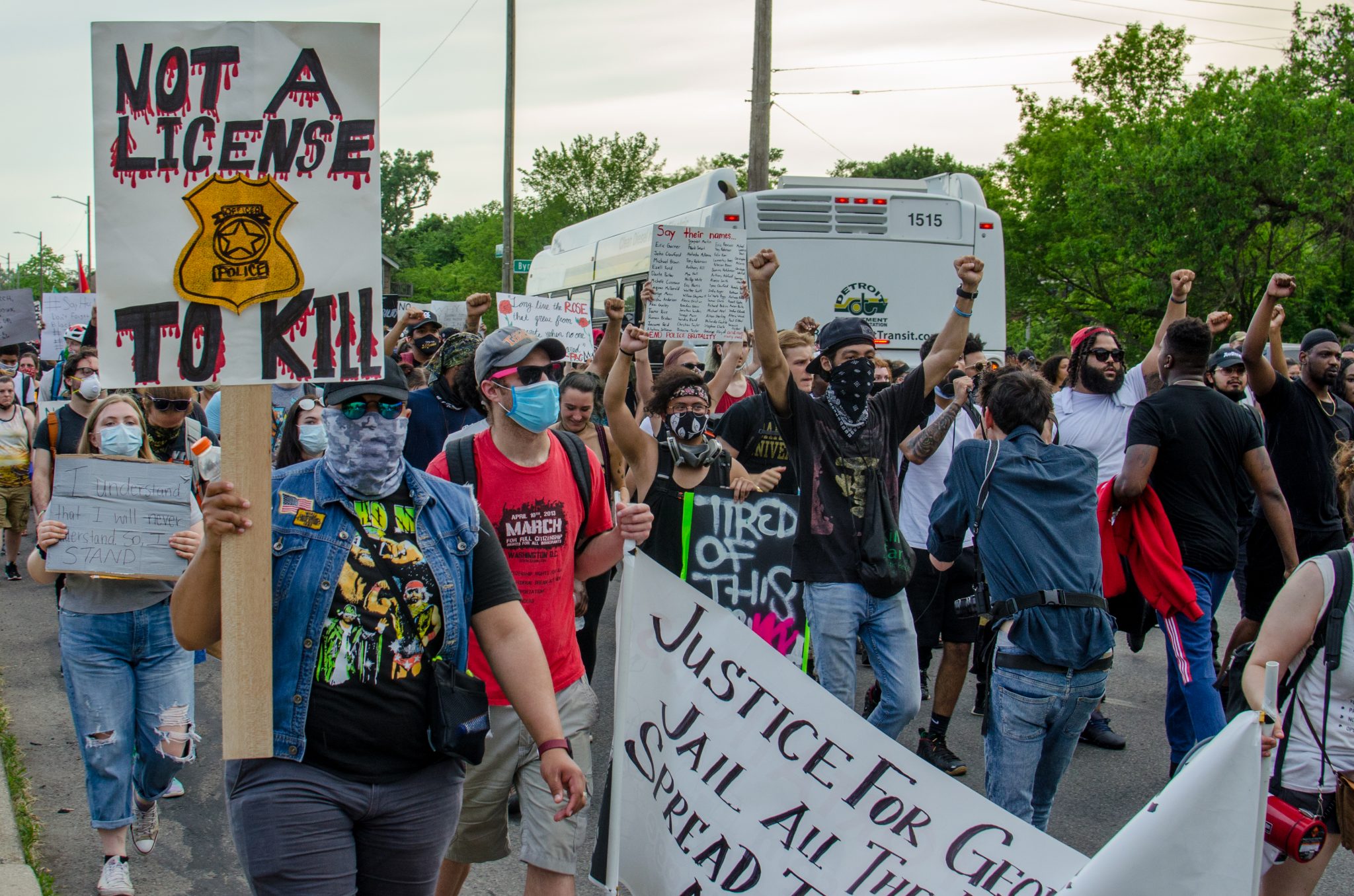Following a Year of Protests, Detroiters Will Elect a New Slate of Police Commissioners
Amid calls to “defund the police” and allegations of police misconduct, how is Detroit’s protest movement affecting this year’s elections for the Board of Police Commissioners?

Elections for Detroit’s Board of Police Commissioners happen every four years. And this year’s race follows a series of police killings of Black Americans like George Floyd and Breonna Taylor. The race for the 11-member civilian board comes after concerns over police brutality and racial injustice reached a boiling point last summer.
Detroit Will Breathe led many of the city’s marches last year. The activist collective rallied to “defund the police,” demanding to end Detroit surveillance programs like Project Green Light. Protesters were confronted by the Detroit Police Department, who used tear gas, chokeholds and rubber bullets to arrest hundreds of demonstrators.
“The elected officials have failed the city of Detroit, and we don’t presume that electing more people who represent the Democratic Party is going to solve the problems of Detroit.” –Lloyd Simpson, Detroit Will Breathe
Detroit Will Breathe later sued the city, claiming officers used excessive force and violated their First Amendment rights. The case is going through federal court, but Judge Laurie Michelson dismissed attempts by the city to countersue the group. She also issued a restraining order against the police department, preventing it from using certain tactics against protesters.
More recently, Detroit Will Breathe disrupted a campaign announcement by former Detroit Police Chief James Craig, who is running to unseat Gov. Gretchen Whitmer next year.
Despite its positions, members of the collective say they’re wary about getting involved in mainstream politics.
“The elected officials have failed the city of Detroit, and we don’t presume that electing more people who represent the Democratic Party is going to solve the problems of Detroit,” says Detroit Will Breathe organizer Lloyd Simpson.
The group’s demands go beyond policing and call for improving infrastructure, housing and education. But Detroit Will Breathe has not put forward any candidates to run for office. Simpson says because there’s no room for political opposition in the city, the group will hold elected officials accountable on the streets.
“Electoral politics have failed the city of Detroit, clearly,” says Simpson. “You have a City Council rampant with corruption. A mayor who has been embroiled in scandals.”
“We don’t endorse political candidates, and we’re never going to get behind a political candidate,” he adds.
Candidates Seek to Challenge Status Quo
While Detroit Will Breathe is staying out of this year’s elections, last summer’s protests have inspired some candidates to challenge the status quo in law enforcement. Landis Spencer is running for the city’s Board of Police Commissioners in District 6. He says Detroit is among a small group of cities with a civilian check on policing, but many residents aren’t even aware of it.
“They haven’t really made much news, which is pretty shocking. In the Blackest city in the entire country, you would think that the citizen’s oversight body would make some headlines for some police reform,” says Spencer.
Police commissioners drafted some new policies on officer “use-of-force” following last year’s protests. And recently, the board changed rules around towing amid a federal corruption probe.
But many Detroiters worry that the board’s lingering dysfunction and infighting have stalled accountability on citizen complaints and rising violent crime. Those concerns are voiced weekly at meetings.
“In the Blackest city in the entire country, you would think that the citizen’s oversight body would make some headlines for some police reform.” –Landis Spencer, candidate for the Board of Police Commissioners
“You’ll be shocked by how much time is spent not holding police officers or anyone in the department accountable,” says Bryce Huffman, a reporter with Bridge Detroit.
Huffman says lack of productivity has led many incumbents to opt out of running again, leaving some seats without any candidates on the ballot and few challengers to those who remain. With two seats likely unfilled, and the guarantee of four appointments, Mayor Mike Duggan is positioned to handpick most of the police commission.
“When no one is running, all that does is make it easier for the board to not be in the mind of the public, not be on people’s radar,” says Huffman.
In 1973, during some of the worst violence Black Detroiters experienced at the hands of a predominantly white police force, residents voted to create the Board of Police Commissioners. The same election brought Mayor Coleman Young to office, who campaigned on and then acted on promises to disband DPD’s controversial STRESS unit.
Fifty years later, on the heels of another generational civil rights movement, many wonder when the next wave of police reforms will become a reality.
Listen: How a year of protests is affecting the race for Detroit’s Board of Police Commissioners.
Trusted, accurate, up-to-date.
WDET strives to make our journalism accessible to everyone. As a public media institution, we maintain our journalistic integrity through independent support from readers like you. If you value WDET as your source of news, music and conversation, please make a gift today.
